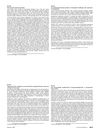Specific Dermatologic Features of Polycystic Ovary Syndrome and Its Association with Biochemical Markers of Metabolic Syndrome and Hyperandrogenism
February 2010
in “
Acta Obstetricia et Gynecologica Scandinavica
”

TLDR Hirsutism is a strong sign of high male hormones and metabolic problems in women with PCOS, but acne and hair loss are not.
The study examined 115 untreated women with polycystic ovary syndrome (PCOS) to explore the connection between dermatologic features and biochemical markers of metabolic syndrome and hyperandrogenism. It found that hirsutism, with a 73.9% prevalence, was strongly linked to higher levels of total testosterone, fasting glucose, and total cholesterol, suggesting a significant association with hyperandrogenism and metabolic issues. Seborrhea, present in 34.7% of participants, was associated with higher free testosterone, fasting glucose, and insulin levels. In contrast, acne and androgenic alopecia, despite their respective prevalences of 53% and 34.7%, were not reliable indicators of hyperandrogenism. The study concluded that hirsutism is a strong marker of hyperandrogenism and metabolic abnormalities in PCOS, while acne and androgenic alopecia are not.












